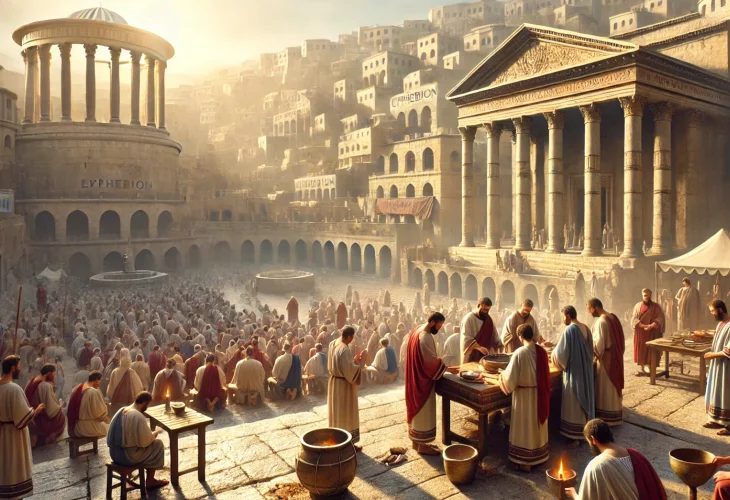The Struggle for High Priesthood: How Greek Culture Invaded Jerusalem
Beyond tarnishing the sanctity of high priesthood, Jeshua, inclined towards Greek culture, changed his name to Jason and initiated transforming Jerusalem into a Greek 'polis'.

In 175 BCE, High Priest Onias journeyed to Antioch to clear his name of allegations spread by Jewish traitors, led by Shimon the Benjaminite. Upon arrival, he discovered that King Seleucus had passed away, and Antiochus IV had taken the throne. The new king, preoccupied with state affairs, had no time for the Jewish high priest, forcing Onias to wait patiently.
Meanwhile, Onias's younger brother, Jeshua, approached the king, claiming that Onias was neglecting the Temple and supporting Ptolemy, among other accusations. He proposed that the king appoint him, Jeshua, as high priest, offering 440 silver talents in exchange.
The greedy king quickly agreed, granting Jeshua the role. This marked the first instance where a high priest was replaced under such disgraceful circumstances. Besides degrading the high priesthood into a position bought with money, Jeshua was generally inclined towards Greek culture. He changed his name to Jason and began converting Jerusalem into a Greek 'polis'. He established a gymnasium and an ephebion, institutions for promoting Greek culture, and began registering citizens interested in becoming Greek nationals. Consequently, priests would offer the daily sacrifices in the morning and then head to the city outskirts, where they would engage in scantily clad athletic exercises.
Jason governed Jerusalem for three years. In 172, a Greek Olympics was held in Tyre, with city delegations competing in various sports. Shamefully, a delegation of priests from Jerusalem also participated. Jason sent a monetary gift from the Temple to the Tyrian idol, Heracles, but the priests refused such betrayal and instead donated the gift for the renovation of the Tyre harbor.
On his brother Onias, who had been ousted from the high priesthood, remained in Antioch, fearing Jason’s corrupt influence. Following the Tyrian Olympics, Jason sent his Hellenized ally Menelaus (brother of Shimon the Benjaminite) to settle accounts with Antiochus. They systematically transferred Temple funds to the king, thereby securing control over Judea. On that trip, Menelaus needed to apologize for delayed payments and bribed the king's official with golden vessels stolen from the Temple. Onias, who heard of this, could not hold back and vehemently protested against the sacrilege and embezzlement. Menelaus hired a Greek officer named Andronicus to kill Onias, thus marking the end of the last of the House of Zadok high priests.
Onias's son, Onias IV (according to one version), believed he was entitled to inherit the priesthood. Seeing no chance in Jerusalem, as the priesthood there deteriorated, he left and established a Jewish temple, later known as Onias's Temple.
In the end, betrayal begets betrayal. Menelaus, Jason’s official, asked himself: if I'm already committing sacrilege, betraying, and stealing, and bribing the king and his officials, why do it for Jason? I’ll offer the money for my appointment! He executed his plan by presenting a large sum from the Temple's treasures to the king, securing a promise of appointment as high priest.
In 170 BCE, Menelaus returned to Jerusalem with a guard detachment, expelled his former ally Jeshua from the city, and warned him that if he returned, he would be hanged. Menelaus took the high priesthood for himself and appointed Lysimachus as a rogue agent. This official roamed shops and estates, seizing everything within reach to appease the king and his officials. Menelaus was even worse than Jeshua, flagrantly trampling on the commands of the Temple and the residents of Judea and Jerusalem.

